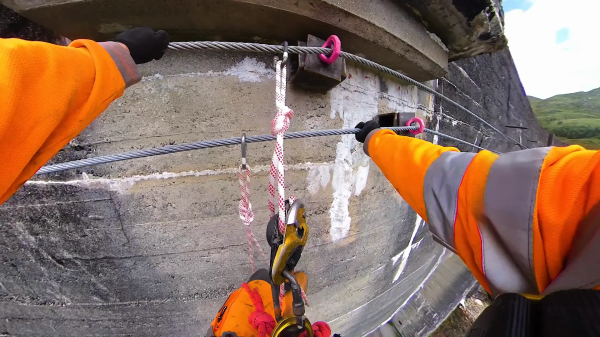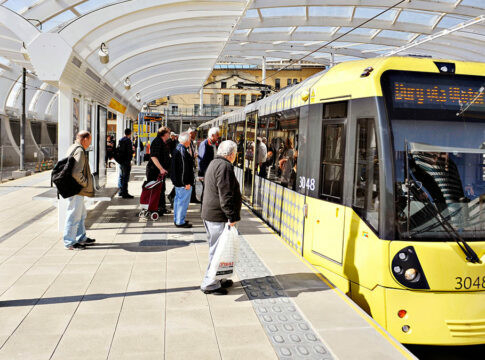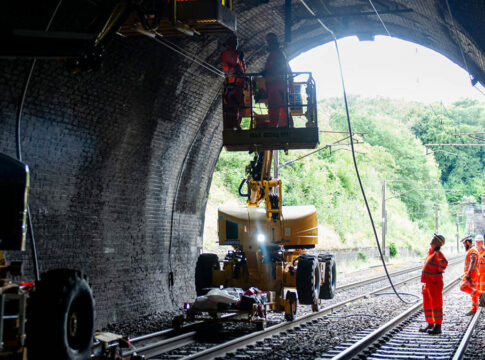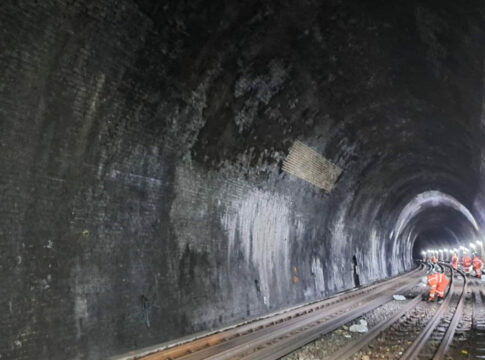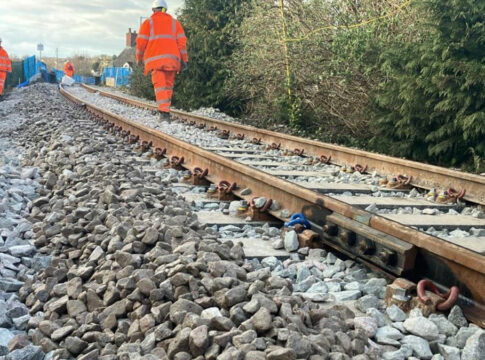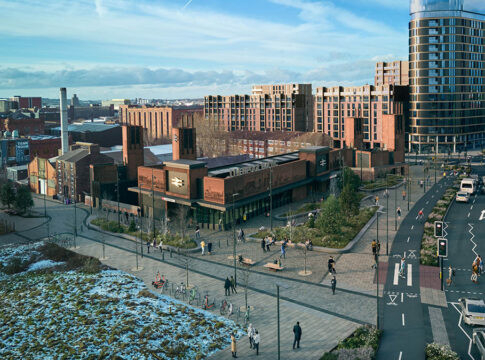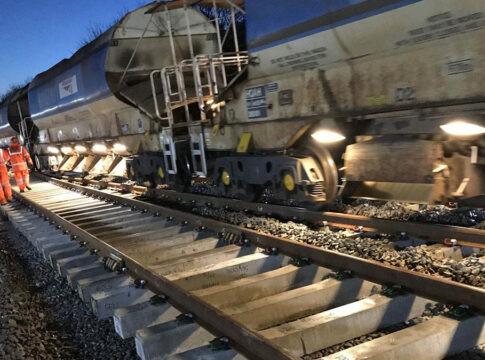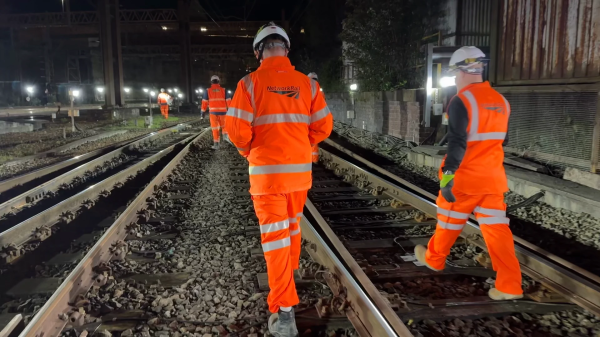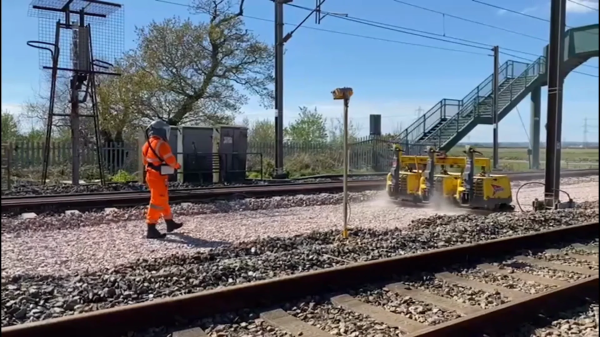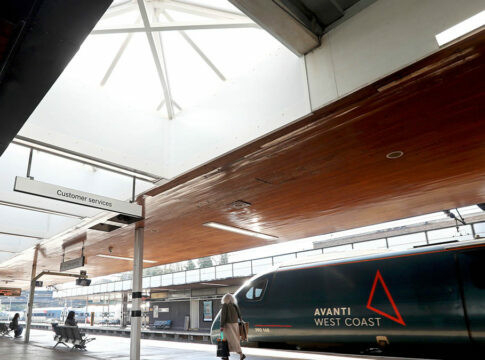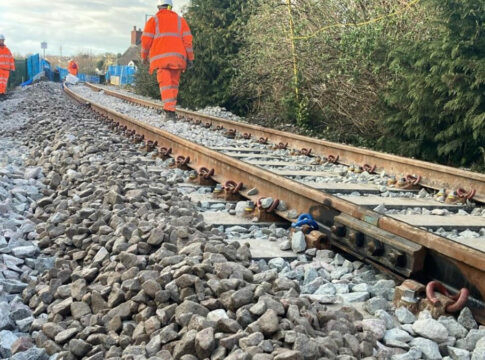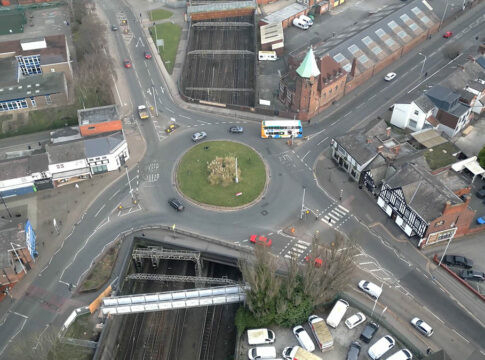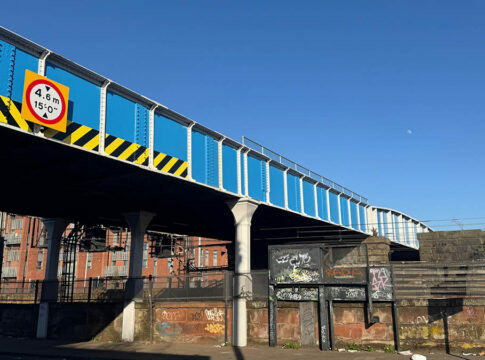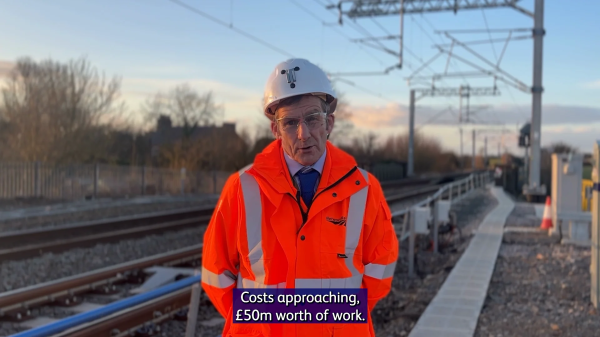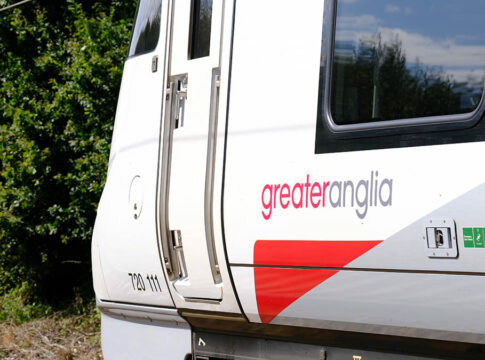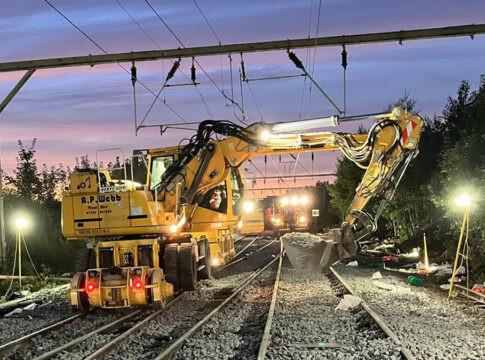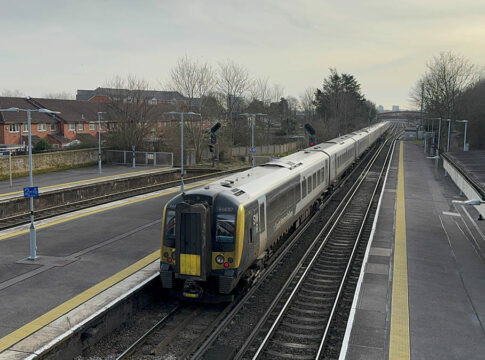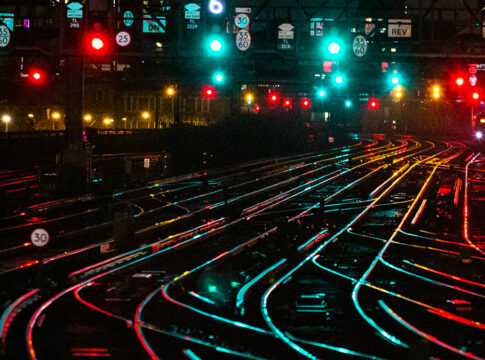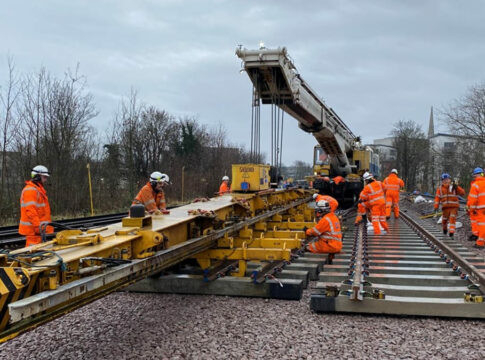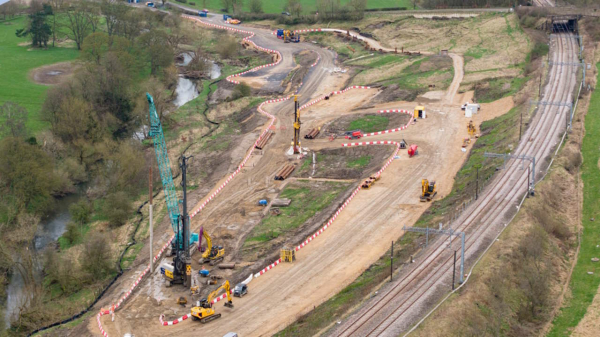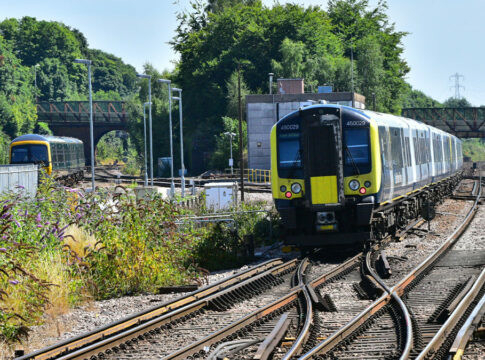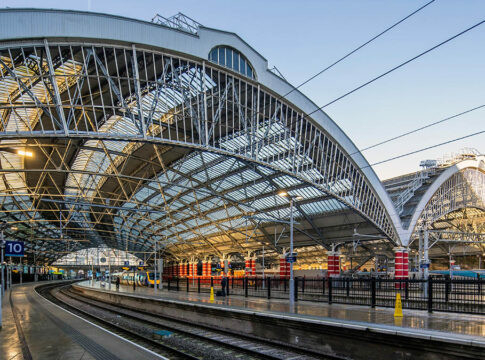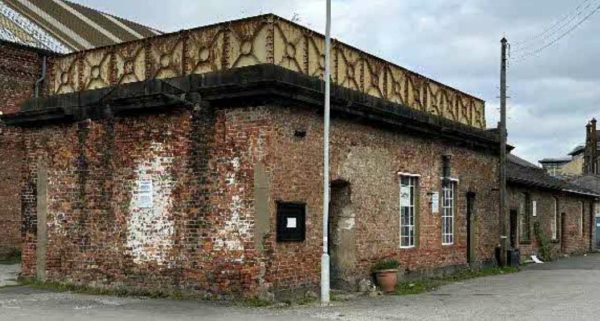Suche
Beiträge, die mit INFRASTRUCTURE getaggt sind
“Our first home buyer #mortgage #deductibility scheme is going to finally give first home buyers the firepower they need to purchase a #home.
We’re going to, through our housing #infrastructure program, deliver more homes for those first home #buyers.
So if you think the status quo is OK, that’s really what #Labor is offering.
The #Coalition (#LNP / #Liberal) believes that home #ownership is something that every generation of #Australians deserve, and that’s precisely what we’ll deliver, if we’re given the great honour of being elected” — #MichaelSukkar
The Opposition minister for #housing, who in his previous stint in government as Minister but nothing to show for it.
#AusPol / #finance / #banks / #Infrastructure <https://www.theguardian.com/australia-news/live/2025/apr/16/australia-election-2025-live-anthony-albanese-peter-dutton-coalition-labor-housing-cost-of-living-bandt-greens-ntwnfb?page=with%3Ablock-67ff2a5d8f089c7bf64d5887#block-67ff2a5d8f089c7bf64d5887>
Engineers work their magic on world-famous Glenfinnan Viaduct - VibeWire Magazine
A team of specialist engineers have cast a protective spell over the iconic Glenfinnan Viaduct with the completion of a year-long, £3.4 million restoration project.Guest authors (VibreWire Online)
Essential tram track replacement works completed at key city centre location as improvements to network continue - VibeWire Magazine
Essential work to install new tram tracks in Manchester city centre has been successfully completed on time as part of a planned £147m package to maintain, upgrade and improve the Metrolink network up to 2027.Guest authors (VibreWire Online)
London journeys affected as major digital milestone sees traditional signals removed - VibeWire Magazine
Passengers are urged to plan ahead as no trains will be running between London King’s Cross and Peterborough over a weekend in May as work to transform East Coast Main Line continues.Guest authors (VibreWire Online)
Passengers asked to plan ahead as further 10-week closure of Blackheath rail tunnel means train journeys will change - VibeWire Magazine
Repair work to the Blackheath railway tunnel being undertaken by Network Rail means that train services will be diverted via Greenwich.Guest authors (VibreWire Online)
Major digital signalling upgrades to affect journeys between London and Peterborough/Royston - VibeWire Magazine
Thameslink and Great Northern passengers urged to plan ahead as no trains will travel to and from London King’s Cross over a weekend in May for East Coast Main Line transformation work.Guest authors (VibreWire Online)
Essential maintenance work to maintain safety and reliability on the Heart of Wales line - VibeWire Magazine
Network Rail will be carrying out essential maintenance work on the Heart of Wales line between Llanwrtyd and Pantyffynnon from Tuesday 6 May to Friday 23 May.Guest authors (VibreWire Online)
Next stop Liverpool Baltic as £100m new station gets the green light! - VibeWire Magazine
Trains will soon be arriving in one of the world’s coolest neighbourhoods, after plans for the £100m Liverpool Baltic station were given the green light! Liverpool City Council today (Tuesday 22nd April) approved plans for the new station which is ex…Guest authors (VibreWire Online)
One week to go – Vital maintenance work taking place on the Ebbw Vale line this month - VibeWire Magazine
Rail passengers are reminded that essential maintenance work will close the Ebbw Vale line at the end of April.Guest authors (VibreWire Online)
Track level footage released of major Stockport railway bridge renewal - VibeWire Magazine
Hundreds of railway engineers have completed the first main phase to replace an important road junction over the Manchester-spur of the West Coast Main Line in Stockport.Guest authors (VibreWire Online)
Better journeys for passengers after Easter rail upgrades in Cumbria - VibeWire Magazine
Footage has been released of major railway upgrades over the bank holiday on the West Coast Main Line north.Guest authors (VibreWire Online)
RAIB Report: Track worker near miss at Chiltern Green - VibeWire Magazine
RAIB has today released its report into a track worker near miss at Chiltern Green, between Harpenden and Luton, 23 April 2024.Guest authors (VibreWire Online)
Coventry station brightened up with £600,000 investment to replace skylights - VibeWire Magazine
A project to replace the skylights at Coventry station has now been completed thanks to a £600,000 investment from Avanti West Coast, Network Rail and the Railway Heritage Trust.Guest authors (VibreWire Online)
Electric upgrade work by UK Power Networks Services supports roll out of new trains on Piccadilly line - VibeWire Magazine
UK Power Networks Services will support the rollout of new trains on London Underground’s Piccadilly line with the signing of a new £24million contract to upgrade the High Voltage power network.Guest authors (VibreWire Online)
Essential maintenance work to maintain safety and reliability on the Heart of Wales line - VibeWire Magazine
Network Rail will be carrying out essential maintenance work on the Heart of Wales line between Llanwrtyd and Pantyffynnon from Tuesday 6 May to Friday 23 May.Guest authors (VibreWire Online)
Passengers urged to check before travelling over bank holiday weekend as Network Rail carries out vital upgrades - VibeWire Magazine
Passengers are being reminded to check before travelling this Easter weekend as Network Rail delivers vital upgrades and track renewals to improve train performance and reliability.Guest authors (VibreWire Online)
Passengers reminded to check before travelling ahead of major Easter weekend rail upgrades - VibeWire Magazine
Passengers travelling in the North West of England are being advised to plan their journeys in advance over the Easter bank holiday weekend.Guest authors (VibreWire Online)
140-year-old rail bridges revived in Glasgow city centre - VibeWire Magazine
Historic rail bridges near Glasgow Central Station are standing the test of time with a £1.5 million makeover.Guest authors (VibreWire Online)
Vital maintenance work taking place on the Ebbw Vale line this month - VibeWire Magazine
Rail passengers are reminded that essential maintenance work will close the Ebbw Vale line at the end of April.Guest authors (VibreWire Online)
„Al-Ahli hospital struck, says Gaza’s civil defence agency, amid widening Israeli offensive that has cut off access to southern city of Rafah.“
https://www.theguardian.com/world/2025/apr/13/gaza-city-hospital-hit-ahli-baptist-civil-defence-agency-israel-intensifies-military-operations-katz?CMP=share_btn_url
See also:
„Israeli air strike destroys part of last functioning hospital in Gaza City“
https://www.bbc.com/news/articles/cjr7l123zy5o

Israeli air strike destroys part of last functioning hospital in Gaza City
The Israel Defense Forces said the hospital contained a "command and control center used by Hamas".Rushdi Abualouf (BBC News)
The Chinese delegation linked years of intrusions into computer networks at U.S. ports, water utilities, airports and other targets, to increasing U.S. policy support for Taiwan, the people, who declined to be named, said.
The first-of-its-kind signal at a Geneva summit with the outgoing Biden administration startled American officials used to hearing their Chinese counterparts blame the campaign, which security researchers have dubbed Volt Typhoon, on a criminal outfit, or accuse the U.S. of having an overactive imagination."
https://www.wsj.com/politics/national-security/in-secret-meeting-china-acknowledged-role-in-u-s-infrastructure-hacks-c5ab37cb
#USA #CyberSecurity #China #StateHacking #VoltTyphoon #Infrastructure
London Euston passengers reminded to ‘travel either side’ this Easter - VibeWire Magazine
Network Rail is advising passengers traveling between London Euston and Scotland over the Easter bank holiday to plan their journeys either side of the long weekend while essential upgrades take place on the West Coast Main Line.Guest authors (VibreWire Online)
Greater Anglia customers reminded to check before travelling over Easter due to engineering works - VibeWire Magazine
There are planned essential engineering works and upgrades taking place on parts of the Greater Anglia rail network over the Easter period.Guest authors (VibreWire Online)
Passengers reminded to check before travelling ahead of major Easter weekend rail upgrades - VibeWire Magazine
Passengers travelling between London Euston and Scotland are being advised to plan their journeys in advance over the Easter bank holiday weekend.Guest authors (VibreWire Online)
Major engineering work across the south coast to impact services in Southampton, Portsmouth and Bournemouth during the Easter holidays - VibeWire Magazine
Rail passengers are being advised to plan their journeys in advance over Easter as Network Rail delivers an £86m investment programme consisting of more than 300 upgrade projects across the country.Guest authors (VibreWire Online)
SB 2570 / HB 2031: Heightened penalties for #protesters who block #streets and #highways
Significantly increases the penalty for knowingly or recklessly obstructing a street, highway, “or other place used for the passage of vehicles or conveyances.” Instead of a Class A misdemeanor, as provided by prior law, the offense is now a Class D felony punishable by at least 2 and up to 12 years in prison and a $5,000 fine. As written, the law's felony offense can cover protesters who block a street or make passage "unreasonably inconvenient" even if there are no cars on it. The felony offense can also seemingly apply to protesters who block a driveway or alley, even temporarily. The law also creates a new civil cause of action, such that anyone who knowingly or recklessly blocks a street can additionally be sued for civil damages.
Full text of bill:
https://wapp.capitol.tn.gov/apps/BillInfo/Default.aspx?BillNumber=SB2570&GA=113
Status: enacted
Introduced 23 Jan 2024; Approved by Senate 23 April 2024; Approved by House 23 April 2024; Signed by Governor Lee 9 May 2024
Issue(s): Civil Liability, Traffic Interference
SB 451 / HB 881: Mandatory penalties for expanded aggravated riot offense
Expands the definition of "aggravated riot" and creates new mandatory minimum penalties for that offense. To be convicted of "riot" under Tennessee law, a person only needs to knowingly gather with two or more people whose tumultuous and violent conduct creates "grave danger of substantial damage to property or serious bodily injury to persons or substantially obstructs law enforcement or other governmental function." For instance, one could be held guilty of riot for merely joining a large protest in which there is isolated pushing, even if no one is injured. Under preexisting law, a person could be held liable for aggravated riot if they participated in a riot where someone was injured or substantial property damage occurred, even if the person did not commit any violence nor intended violence to occur. Under the law, a person may also be guilty of aggravated riot if they participated in a riot and either participated in exchange for compensation or "traveled from outside the state with the intent to commit a criminal offense." A "criminal offense" could include, for example, temporarily blocking a street as part of a protest. "Aggravated riot" is a Class E felony, which is punishable by up to 6 years in jail and a fine of $3,000; the law also introduces a mandatory minimum of at least 45 days of imprisonment.
Full text of bill:
https://wapp.capitol.tn.gov/apps/BillInfo/default.aspx?BillNumber=SB0451&GA=112
Status: enacted
Introduced 8 Feb 2021; Approved by Senate 11 March 2021; Approved by House 28 April 2021; Signed by Governor 13 May 2021
Issue(s): Riot
HB 8005/SB 8005: Heightened Penalties for "Inconvenient" Protests and #ProtestCamps on State Property
The law heightens penalties for certain offenses that could encompass conduct by peaceful protesters. The law heightens existing criminal penalties for blocking a street, sidewalk, or "any other place used for the passage of persons, vehicles or conveyances" from a Class C to a Class A misdemeanor. Accordingly, protesters who obstruct or make it "unreasonably inconvenient" to use a street or sidewalk could face up to one year in jail. The law likewise heightens penalties for the existing offense of "obstructing" or "interfering with" a lawful meeting, procession, or gathering, from a Class B to Class A misdemeanor. Protesters who intentionally "interfere with" a meeting of the legislature or other government officials, including by staging a loud protest, could therefore face up to one year in jail. The law also targets protest encampments on the grounds of the Capitol and other areas by broadening the definition of "camping," and heightening penalties for camping on state property. As such, protesters who use or place any "piece of furniture," shelter, or structure on state property could be charged with a Class E felony, if they continue to do so 24 hours after receiving a warning. The offense would be punishable by up to six years in prison, a fine of $3,000, and restitution for any property damage. The law also amends Tennessee provisions on "riot," (which is defined broadly), including by requiring those convicted of "inciting" or "urging" a riot to pay restitution for any property damage incurred by the offense. When it was introduced, the legislation authorized the Tennessee Attorney General to intervene and prosecute offenses where there has been damage to state property, including those arising in the context of peaceful protests, if the district attorney declined to do so; however those provisions were removed prior to the law's enactment, and replaced with a requirement that district attorneys produce a report on such offenses and how they were dealt with.
Full text of bill:
https://wapp.capitol.tn.gov/apps/BillInfo/Default.aspx?BillNumber=HB8005&GA=111
Status: enacted
Introduced 7 Aug 2020; Approved by House and Senate 12 August 2020; Signed by Governor Lee 20 August 2020
Issue(s): Protest Supporters or Funders, Riot, #TrafficInterference #Camping
SB 264: New penalties for protests near gas and oil pipelines
Creates new potential penalties for protests and demonstrations that "interrupt" or "interfere with" a pipeline or pipeline construction site. The law makes it a Class E felony for an individual to knowingly "destroy, injure, interrupt or interfere with" a #pipeline, pipeline facility, or related infrastructure, including if it is under construction. The offense is a Class E felony, punishable by up to six years in prison and a $3,000 fine. As introduced, the law provided that an individual or organization that causes or "aids" damage or interference would likewise be guilty of a Class E felony, however these provisions were amended out prior to the law's passage.
Full text of bill:
https://wapp.capitol.tn.gov/apps/BillInfo/Default.aspx?BillNumber=SB0264&GA=111
Status: enacted
Introduced 29 Jan 2019; Approved by Senate 18 Feb 2019; Approved by House 30 April 2019; Signed by Governor Lee 10 May 2019
Issue(s): #ProtestSupporters or Funders, #Infrastructure
SB 0902: New penalties for protesters who block traffic
Imposes a new fine on any person who intentionally, knowingly, or recklessly obstructs a public highway or street "including in the course of a protest" and in doing so interferes with an emergency vehicle's access to or through the highway or street. "Emergency vehicle" is broadly defined as "any vehicle of a governmental department or public service corporation when responding to an emergency," a police or fire department vehicle, or an ambulance. Unlawful obstruction of a street or highway was already a Class C misdemeanor subject to up to 30 days in jail; the law adds a $200 fine to the penalty. Sponsors made clear that the law was aimed at protests that obstructed highways.
Full text of bill:
https://legiscan.com/TN/text/SB0902/2017
Status: enacted
Introduced 9 Feb 2017; Governor Haslam signed into law 12 April 2017
Issue(s): #TrafficInterference
SB 672 / HB 729: Felony penalties for blocking traffic or pedestrians
Would significantly increase the penalty for “obstructing” streets, sidewalks, and other public passageways, such that demonstrators in a variety of public locations could face felony charges. Current Tennessee law prohibits intentionally, knowingly, or recklessly blocking or making passage “unreasonably inconvenient” on public streets, sidewalks, elevators, aisles, or “any other place” used for passage of people or vehicles. Under the bill, that offense would be a Class E felony, punishable by up to six years in prison, rather than a misdemeanor. As such, demonstrators in a protest that made it “unreasonably inconvenient” for someone to use a sidewalk or access a public building could be arrested and charged with a felony. If protesters blocked or impeded passage on a highway, it would be a Class D felony, punishable by up to 12 years in prison.
Full text of bill:
https://wapp.capitol.tn.gov/apps/BillInfo/Default.aspx?BillNumber=SB0672
Status: pending
Introduced 31 Jan 2025.
Issue(s): Traffic Interference
#FirstAmendment #CriminalizingDissent
#Authoritarianism #Fascism #Clampdown #CriminalizingProtest
#CharacteristicsOfFascism #USPol #AntiProtestLaws #SlowMarch #PipelineProtests
HB 237: Heightened penalties for street #protesters and #MaskedProtesters
Increases penalties for protesters who block #traffic and for masked protesters who break any law. The law makes it a Class A1 misdemeanor, punishable by up to 150 days in jail and a fine, to willfully impede traffic while participating in a demonstration on a street or highway. Second and subsequent offenses would be a Class H felony, punishable by up to 25 months in prison. Under the law, “organizers” of street protests can be held civilly liable for any injury resulting from delays caused by the obstruction of an emergency vehicle. The law does not define “organizer,” such that anyone involved in the planning of a protest might be covered, nor does it require that the “organizer” have any intent or knowledge that an emergency vehicle would be obstructed. Additionally, the law narrows the health-related exception to North Carolina’s ban on wearing masks in public, requiring that a mask worn for health or safety reasons must be a “medical or surgical grade” mask worn “to prevent[] the spread of contagious disease.” The law broadens the authority of law enforcement and third parties to require someone to remove their masks in such cases. Under the law, someone convicted of any offense, including nonviolent protest-related offenses, can face steeper punishment if they were wearing a mask or other face covering at the time, regardless of the reason for doing so. The bill’s sponsor cited recent #ProPalestine protests on college campuses, in which some protesters have worn masks.
Full text of bill:
https://www.ncleg.gov/BillLookUp/2023/h237
Status: enacted
Introduced 7 May 2024; Approved by Senate 15 May 2024; Approved by House 11 June 2024; Vetoed by Governor Cooper 21 June 2024; Veto overridden 27 June 2024
Issue(s): Civil Liability, Face Covering, Traffic Interference
HB 40: HEIGHTENED PENALTIES FOR "RIOT" AND RELATED OFFENSES
Increases the penalty for an individual who "incites or urges another to engage in a riot," if a riot occurs and results in $1,500 of property damage or injury. In such a case, the individual is guilty of a Class E felony, punishable by more than two years in prison, even if they did not personally cause any damage or injury. Under the law, an individual convicted of "riot" or incitement offenses is also civilly liable to anyone whose property or person was damaged by the riot, in the amount of three times the actual damage in addition to court costs and attorney’s fees. Preexisting North Carolina law defines riot to include a "public disturbance" by a group of three or more people that presents an "imminent threat of disorderly and violent conduct," resulting in a "clear and present danger" of property damage or injury. Under this definition, no violence or damage need occur for participants in a gathering to be arrested for and charged with "riot." While the new law would add a limitation requiring an “overt act” in order for someone to be convicted of a #riot or incitement to riot offense, that requirement could be read broadly to include #PeacefulChanting or #marching with a crowd that is deemed to be a “riot.” Finally, the law requires that a judge, rather than another judicial official, determine the pretrial release of an individual charged with a riot offense. The judge may hold the individual for 24 hours, and may require that they stay away from places where the "riot" occurred. The text of HB 40 is nearly identical to the amended version of HB 805 that passed both the North Carolina House and Senate in 2021 before being vetoed by the Governor.
Full text of bill:
https://www.ncleg.gov/BillLookUp/2023/h40
Status: enacted
Introduced 1 Feb 2023; Approved by House 8 February 2023; Approved by Senate 9 March 2023; Became law without Governor Cooper's signature 21 March 2023
Issue(s): Civil Liability, Riot
SB 58: New penalties for protests near #pipelines
Introduces new potential criminal penalties and civil liability for peaceful protests near existing and planned pipelines and other energy infrastructure. The enacted version of the law makes it a Class C felony offense to knowingly and willfully “obstruct, impede, or impair” or “attempt to obstruct, impede, or impair” the services of an energy facility. The law defines “energy facility” to include any facility involved in the transmission of “electricity, fuel, or another form or source of energy,” including facilities that are under construction or otherwise not functioning. As such, a group of people protesting the construction of a fossil fuel pipeline could face more than 15 years in prison and a mandatory $250,000 fine if they impede or impair the construction of a pipeline, for instance by blocking workers’ access to the pipeline construction site. Under the law, such protesters, along with anyone who “aides or abets, solicits, conspires, or lends material support” to their act of impeding construction could also be sued in civil court by someone whose property was damaged, for an amount equivalent to three times the actual damage as well as court costs and attorneys' fees.
Full text of bill:
https://www.ncleg.gov/BillLookUp/2023/S58
Status: enacted
Introduced 1 Feb 2023; Approved by Senate 14 March 2023; Approved by House 14 June 2023; Signed by Governor Cooper 19 June 2023
Issue(s): Civil Liability, #ProtestSupporters or Funders, #Infrastructure
SB 300: Heightened penalties for "riot"
**Note: This bill was later amended to remove all riot provisions except the increased penalties** Would increase the penalty for engaging in a "riot," from a Class 1 misdemeanor to a Class H felony, punishable by 25 months in prison. If the "riot" resulted in property damage of over $1,500, or serious injury, anyone deemed to have engaged in the "riot" (regardless of their role in the damage or injury) could be convicted of a Class G felony, punishable by 31 months in prison. The bill would not alter North Carolina's broad definition of "riot," which does not require any actual violence or destructive activity. Under the bill, peaceful protesters in a group of three or more who present an "imminent threat of disorderly and violent conduct" that "creates a clear and present danger" of property damage or injury could face felony convictions and lengthy prison sentences. Note: A later amendment eliminated the proposed increase in penalty for engaging in a "riot." It also eliminated the proposal to make it a Class G felony for engaging in a riot that resulted in property damage over $1,500 or serious bodily injury. Instead, it replaced that proposal by making it a Class G felony if during the course of a riot a person caused over $1,500 in property damage or a Class F felony if the person during the course of a riot caused serious bodily injury or brandished a dangerous weapon or substance. It also clarified that "mere presence alone without an overt act" is not sufficient to sustain a conviction of rioting. (See full text of bill here)
Status: enacted with improvements
Introduced 15 Mar 2021; Approved by Senate 12 May 2021; Approved by House 18 August 2021; Signed by Governor Cooper 2 September 2021
Issue(s): Riot
#FirstAmendment #CriminalizingDissent
#Authoritarianism #Fascism #Clampdown #CriminalizingProtest
#CharacteristicsOfFascism #USPol #AntiProtestLaws #PipelineProtests #MaskedProtesters #AntiMaskLaws #SurveillanceState #PipelineProtests
HB 737: #Vague ban on #ResidentialProtests
Broadly criminalizes participating in a protest within 50 feet of a residence that “threatens to disrupt, or harasses” an individual’s “right to control or use” their residence. The law does not make exceptions for protests that take place in #PublicParks or on #sidewalks—traditional public forums—that may be within 50 feet of residential buildings. Nor does the law require any intent on the part of protesters to target a specific residence or to harass or disturb specific residents. The law also does not require that a protest actually disrupt an individual's right to use their residence, only that it "threaten" to do so. It is also unclear what would constitute "harassing" an individual's right to use their residence, for the purpose of the law.
Full text of bill:
https://www.legis.la.gov/legis/BillInfo.aspx?s=24RS&b=HB737&sbi=y
Status: enacted
Introduced 18 Mar 2024; Approved by House 9 April 2024; Approved by Senate 20 May 2024; Signed by Governor Landry 18 June 2024
HB 383: Civil immunity for drivers who hit protesters
Limits the civil liability of drivers who injure or kill protesters who were unlawfully in the street. The law provides that if a driver hits someone who was illegally “blocking a roadway,” the driver cannot be sued for any injury, death, or damage if he “reasonably believe[d]” that he was in immediate danger of injury and was trying to “retreat or escape.” The sponsor cited a rise in protests across the country as motivation for the bill.
Full text of bill:
https://www.legis.la.gov/legis/BillInfo.aspx?s=24RS&b=HB383&sbi=y
Status: enacted
Introduced 29 Feb 2024; Approved by House 8 April 2024; Approved by Senate 20 May 2024; Signed by Governor Landry 11 June 2024
Issue(s): #DriverImmunity, #TrafficInterference
HB 205: New #racketeering penalties for protesters
Adds nonviolent protest-related offenses to the underlying crimes that can be prosecuted under Louisiana’s racketeering law, which carries steep penalties. Offenses that are now covered by the racketeering law include “simple #obstruction of a #highway of commerce,” “#riot,” “inciting to riot,” "institutional #vandalism," and “aiding and abetting others to enter or remain on premises where forbidden.” As such, individuals in a protest that merely makes movement on a #highway “more difficult” (a minor misdemeanor offense) could be charged with a violation of Louisiana’s racketeering law if they did so more than once and as part of an enterprise with others. Louisiana law defines “riot” broadly, requiring no actual violence or damage but three or more people engaged in a “#PublicDisturbance” that creates a “danger of injury or damage” by an “imminent threat of tumultuous and violent conduct,” so individuals who participate in tumultuous protests could likewise be charged with racketeering. The law also adds “criminal damage to a critical infrastructure” to the racketeering law, such that certain #CivilDisobedience actions near #pipelines and other #infrastructure, including sites under construction, could be covered as well. Racketeering violations are punishable by up to 50 years in #prison with #HardLabor and a one million dollar fine.
Full text of bill:
https://www.legis.la.gov/legis/BillInfo.aspx?i=245811&sbi=y
Status: enacted
Introduced 26 Feb 2024; Approved by House 2 April 2024; Approved by Senate 14 May 2024; Signed by Governor Landry 10 June 2024
Issue(s): #ProtestSupporters or Funders, Infrastructure, Riot, #Trespass
HB 127: Heightened penalties for #StreetProtesters and organizers
Increases existing penalties for impeding traffic and creates a new offense that could cover individuals who plan or organize protests that would impede traffic. Under prior law in Louisiana, engaging in conduct that makes movement on any road “more difficult” was a misdemeanor, punishable by six months in jail and $200. The law adds an offense of “#conspiracy” or “aiding and abetting” of others to engage in such conduct. As written, the new offense does not require that that the protest or other act actually take place or that it actually impede traffic. The law also increases the fine for both offenses to $750.
Full text of bill:
https://legis.la.gov/legis/BillInfo.aspx?s=24RS&b=HB127&sbi=y
Status: enacted
Introduced 22 Feb 2024; Approved by House 15 April 2024; Approved by Senate 16 May 2024; Signed by Governor Landry 10 June 2024
Issue(s): Protest Supporters or Funders, Traffic Interference
HB 727: NEW PENALTIES FOR PROTESTS NEAR GAS AND OIL PIPELINES
Targets protests around gas and oil #pipelines by expanding the definition of "critical infrastructure" and providing for the offense of "unauthorized entry of a critical infrastructure." Under the law, "critical infrastructure" is amended to include "pipelines," "any site where the construction or improvement of [pipelines or any other listed infrastructure facility] is taking place," as well as "all structures, equipment, or other immovable or movable property located within or upon" such facilities. Unauthorized entry onto critical infrastructure property as defined above is punishable by imprisonment with or without hard labor for up to five years and a fine of $1,000. As originally introduced, the law included a new crime of "conspiracy to engage in unauthorized entry" of a critical infrastructure facility, punishable by imprisonment with or without hard labor for up to five years and a fine of $10,000, such that individuals who only planned to hold a peaceful protest on infrastructure property could be prosecuted. The amended and enacted version of the bill removed the provisions on conspiracy, however. In addition, prior to the law's enactment, provisions were added to mandate that the law would not apply to "[l]awful assembly and peaceful and orderly petition, picketing, or demonstration for the redress of grievances or to express ideas or views regarding legitimate matters of public interest."
Full text of bill:
https://www.legis.la.gov/legis/BillInfo.aspx?s=18RS&b=HB727&sbi=y
Status: enacted
Introduced 26 Mar 2018; Approved by House 12 April 2018; Approved by the Senate 8 May 2018; Signed into law by Governor Edwards 30 May 2018
Issue(s): Infrastructure, #Trespass
#FirstAmendment #CriminalizingDissent
#Authoritarianism #Fascism #Clampdown #CriminalizingProtest
#CharacteristicsOfFascism #USPol #AntiProtestLaws #PipelineProtests #HeatherHeyer #UniteTheRight #DrivingDownProtestors
HB 399: New penalties for protesters at the capitol
Creates serious new criminal offenses that can cover #PeacefulProtesters at the #StateCapitol, as well as anyone who “conspires” with or otherwise supports them. The first new offense applies to someone who enters the capitol, or impedes access to the capitol by a legislator or legislative staff, with intent to disrupt or impede legislative business—regardless of whether legislative business was in fact “impeded.” “Conspir[ing]” to engage in such conduct or “facilitat[ing]” another person to engage in the conduct is subject to the same penalties as actually engaging in it. It is a Class B misdemeanor (punishable by up to 3 months in jail) for a first incident, and a Class A misdemeanor (up to one year in jail) for subsequent incident. The law creates a second, more serious offense for someone who engages in “disorderly or disruptive conduct” inside the Capitol with intent to disrupt or impede legislative business, if their conduct in fact “disrupts” or “impedes” the legislature’s business—even momentarily. As written, the offense could cover a demonstrator who shouts a single chant during a legislative hearing. “Conspir[ing]” to engage in such conduct or “facilitat[ing]” another person to engage in the conduct is subject to the same penalties as actually engaging in it. The offense would be a Class A misdemeanor (punishable by up to one year in jail) for the first incident, and a Class D felony (up to 5 years in prison) for third and subsequent incident. Prior to passing the bill, lawmakers added an amendment which provides that the law will not be construed "to prohibit... [a]ssembly in traditional public forums, including but not limited to the Capitol rotunda and outdoor areas of the Capitol grounds." While helpful, the amendment does not immunize all peaceful protest activity that the law could potentially punish, including protest organizing. When he vetoed the bill (later overridden), Governor Beshear noted the risks it poses to lawful First Amendment activity.
Full text of bill:
https://apps.legislature.ky.gov/record/25rs/hb399.html
Status: enacted
Introduced 6 Feb 2025; Approved by House 7 March 2025; Approved by Senate 13 March 2025; Vetoed by Governor Beshear 25 March 2025; Veto overridden 27 March 2025
Issue(s): Protest Supporters or Funders, Police Response
HB 44: New penalties for protests near #pipelines and other infrastructure
Creates new potential criminal and civil penalties for protests around oil or gas pipelines and other infrastructure facilities. Like HB 238, introduced in the 2019 session, HB 44 amends the definition of "key infrastructure assets" under Kentucky law to include "natural gas or petroleum pipelines." Encompassed facilities and properties designated "key infrastructure assets" are not limited to areas that are fenced off or posted by "no entry" signs. Trespass onto "key infrastructure assets" is a Class B misdemeanor for the first offense (up to three months in jail) and a Class A misdemeanor for subsequent offenses (up to one year in jail). As introduced, the bill created a new offense for a person who "intentionally or wantonly... tampers with, impedes, or inhibits operations of a key infrastructure asset." This conduct would comprise "criminal mischief in the first degree"--a Class D felony, which under Kentucky law can be punished by up to five years in prison. A protest that "impeded" access to a pipeline by blocking a road, or one that "inhibited" the operation of a pipeline by blocking pipeline construction, could presumably have fallen under this definition. Prior to the law's enactment, lawmakers removed the language penalizing activity that "impeded" or "inhibited" operations of infrastructure like a pipeline. The enacted version instead penalizes "tamper[ing] with the operations of a key infrastructure asset... in a manner that renders the operations harmful or dangerous." The introduced bill also provided that any "person" (which under Kentucky law could include an organization) may be civilly liable if they "knowingly compensate[] or remunerate[]" another person to commit criminal mischief on a key infrastructure asset. Prior to enactment, this was narrowed to anyone who "knowingly directs or causes a person" to commit the tampering offense.
Full text of bill:
https://apps.legislature.ky.gov/record/20rs/hb44.html
Status: enacted
Introduced 29 Aug 2019; Prefiled as BR 204 on 29 August 2019; Approved by House 10 February 2020; Approved by Senate 5 March 2020; Signed by Governor Beshear on 16 March 2020
Issue(s): Civil Liability, #ProtestSupporters or Funders, #Infrastructure, #Trespass
#FirstAmendment #CriminalizingDissent
#Authoritarianism #Fascism #Clampdown #CriminalizingProtest
#CharacteristicsOfFascism #USPol #AntiProtestLaws #PipelineProtests
SB 172: New penalties for protests near gas and oil #pipelines
Creates four new criminal offenses that could capture the conduct of peaceful protesters near pipelines. Under the law, entering or remaining in a "critical infrastructure" facility, or on property containing such a facility if it is posted with signs or fenced off, is a Class A misdemeanor, punishable by up to one year in jail and a $2,500 fine. Trespassing with intent to "tamper with" a critical infrastructure facility, or to "impede or inhibit" its operations, is a Level 7 felony, punishable by approximately 2 years in prison. Actually, knowingly "tampering with" the facility is a Level 6 felony, punishable by approximately 3 years in prison, and doing so with the intent to impede or inhibit the facility's operations is a Level 5 felony, punishable by approximately 4 years in prison. The law also creates a broad new definition of critical infrastructure," which includes among many other things "a portion of any belowground or aboveground oil, gas, hazardous liquid or chemical pipeline" or any storage, processing, or distribution facility for crude oil or natural gas. When it was introduced, the law included new penalties for "defacing" and "vandalizing" critical infrastructure; civil liability for any person or "entity" that provided compensation to someone to commit the offenses described above; and added the trespass and damage offenses above to the underlying crimes that could be prosecuted under the state's RICO law. These provisions were removed prior to the law's enactment.
Full text of bill:
https://www.kslegislature.gov/li_2022/b2021_22/measures/sb172/
Status: enacted
Introduced 8 Feb 2021; Approved by Senate 2 March 2021; Approved by House 30 March 2021; Signed by Governor Kelly 9 April 2021
Issue(s): Civil Liability, #ProtestSupporters or Funders, #Infrastructure, #Trespass
#FirstAmendment #CriminalizingDissent
#Authoritarianism #Fascism #Clampdown #CriminalizingProtest
#CharacteristicsOfFascism #USPol #AntiProtestLaws #PipelineProtests
SB 471: New penalties for protests near critical infrastructure
Heightens the potential penalties for protests near oil and gas #pipelines and other infrastructure by creating the offenses of "criminal #infrastructure facility #trespass" and "#CriticalInfrastructure facility mischief." The law provides that an individual who knowingly enters a critical infrastructure facility without permission commits critical infrastructure facility trespass, a Level 6 #felony punishable by up to 30 months in prison. Under the law, recklessly or knowingly defacing such a facility constitutes critical infrastructure facility mischief, punishable by up to six years in prison as a Level 5 felony. In either case, the individual may additionally be liable to the property owner for damages, costs, and attorney's fees. An individual found to have conspired with someone who commits either offense may also be liable for a fine of $100,000. The law newly defines "critical infrastructure facility" under Indiana law to include a range of oil, gas, electric, water, telecommunications, and railroad facilities, as well as any "facility that is substantially similar" to one of the listed facilities.
Full text of bill: https://iga.in.gov/legislative/2019/bills/senate/471
Status: enacted
Introduced 14 Jan 2019; Approved by Senate 7 Feb 2019; Approved by House 25 March 2019; Signed by Governor Holcomb on 6 May 2019
Issue(s): #ProtestSupporters or Funders, #Infrastructure
SB 286: New criminal penalties for masked protesters
Would create a new offense for attending a public assembly while wearing a mask, and elevate disorderly conduct and rioting to felony offenses if committed by someone wearing a mask. The bill creates exemptions for masks worn for holidays, theater, religious purposes, medical purposes if prescribed by a doctor, and athletic events, but not protests. Under the bill, someone who wears a mask “while present at a public assembly” would commit a Class C misdemeanor (punishable by up to 60 days in jail) for a first offense but a Class A misdemeanor (up to one year and $5,000) for second and subsequent offenses. As written, the offense could cover a demonstrator who chooses to wear a mask to avoid contagion, to avoid retaliation for their political speech, or for any other reason, and who did not otherwise act unlawfully or have any intent to break a law. The offense would also seemingly cover bystanders “present” at a protest while masked. The bill would convert disorderly conduct and rioting—both broadly defined by Indiana law and typically misdemeanor offenses—into Level 6 felonies (up to two and a half years in prison and $10,000) if committed by someone in a mask. “Disorderly conduct,” for instance, covers someone who recklessly, knowingly, or intentionally “makes unreasonable noise and continues to do so after being asked to stop.” As such, someone who chooses to wear a mask while participating in a peaceful but noisy protest could face felony charges.
Full text of bill:
https://iga.in.gov/legislative/2025/bills/senate/286/details
Status: pending
Introduced 13 Jan 2025.
Issue(s): Face Covering, Riot
#FirstAmendment #CriminalizingDissent
#Authoritarianism #Fascism #Clampdown #CriminalizingProtest
#CharacteristicsOfFascism #USPol #AntiProtestLaws #PipelineProtests #TrafficInterference #MaskBans
HB 2357: New penalties for protests that #BlockTraffic
Would create a new felony offense for protests that block traffic on highways and other busy roadways for more than five minutes. Existing Illinois law already prohibits protests or other assemblies on roadways without a permit or other permission from law enforcement, and requires that such assemblies not obstruct pedestrian or car traffic “in an unreasonable manner;” violations are a Class A misdemeanor offense. Under the bill, blocking “an exceptionally busy public right-of-way” for more than five minutes in a way that prevents “or would prevent” passage of an emergency vehicle, is a Class 4 felony. As written, the felony offense applies regardless of whether an emergency vehicle was actually blocked, or whether the roadway was “exceptionally busy” at the time it was blocked. “Exceptionally busy public right-of-way” is defined as a public road that typically carries at least 24,000 cars daily. The bill would also newly preempt cities and counties from enforcing a more lenient rule related to protests and demonstrations on roadways. The same bill was introduced as HB 5819 during the 2023-2024 session.
Full text of bill: https://www.ilga.gov/legislation/billstatus.asp?DocNum=2357&GAID=18&GA=104&DocTypeID=HB&LegID=160067&SessionID=114
Status: pending
Introduced 4 Feb 2025.
Issue(s): Traffic Interference
HB 1480: NEW PENALTIES FOR PROTESTS NEAR CRITICAL INFRASTRUCTURE
Would create a new felony offense that could cover #NonviolentProtesters at pipeline and other infrastructure sites. Under the bill, someone who knowingly “vandalizes, defaces, tampers with” or damages part of a critical infrastructure facility commits a felony. If the “value of the property” (not the cost of the damage) is less than $500, the offense is a Class 4 felony, punishable by 1-3 years in prison and up to $20,000; if the property value is $500-$10,000, it is a Class 3 felony (2-5 years and $20,000); and if the property value exceeds $10,000, it is a Class 2 felony (3-7 years and $20,000). The bill newly defines "critical infrastructure facility" under Illinois law to include gas and oil #pipelines and a range of pipeline-related facilities, as well as electric, water, telecommunications, railroad, and “health care” facilities, regardless of whether they are fenced off or clearly marked with signs. As such, a protester who chalked or spraypainted a pipeline without damaging its functionality could face felony charges and a lengthy prison sentence if convicted. The bill extends liability to anyone who “conspires with” a person to commit the offense. It also provides that critical infrastructure owners can sue for punitive and compensatory damages. The same bill was introduced as HB 4746 in the 2023-2024 session.
Full bill text: https://www.ilga.gov/legislation/fulltext.asp?DocName=&SessionId=114&GA=104&DocTypeId=HB&DocNum=1480&GAID=18&LegID=157549&SpecSess=&Session=
Status: pending
Introduced 21 Jan 2025.
Issue(s): Civil Liability, #ProtestSupporters or Funders, #Infrastructure
#FirstAmendment #CriminalizingDissent
#Authoritarianism #Fascism #Clampdown #CriminalizingProtest
#CharacteristicsOfFascism #USPol #AntiProtestLaws #PipelineProtests #TrafficInterference
Telent Secures First CP7 Telecoms-Only Framework to Enhance Rail Reliability in Western and Wales - VibeWire Magazine
As part of Network Rail’s five-year planning and funding cycle, Control Period 7 (CP7), Telent has been appointed to deliver a telecoms renewal programme throughout the Wales and Western Region, which spans London to Penzance, Bristol, the Cotswolds …Guest authors (VibreWire Online)
Passengers urged to plan ahead this Easter as essential engineering work takes place across south London, East Kent and East Sussex - VibeWire Magazine
Network Rail and train operators in the south east are urging passengers to plan ahead over the Easter period as a major programme of railway upgrades in south London, Kent and Sussex are delivered.Guest authors (VibreWire Online)
Groundbreaking thermal modelling slashes railway heating costs - VibeWire Magazine
Significant cost and carbon reductions will be delivered through an industry-leading initiative joint developed by Network Rail, AtkinsRéalis, Balfour Beatty and TSO, as the Central Rail Systems Alliance (CRSA).Guest authors (VibreWire Online)
£33m landslip work completed in County Durham - VibeWire Magazine
Network Rail has completed a major £33m project to reinforce land alongside the East Coast Main Line in County Durham.Guest authors (VibreWire Online)
Early May Bank Holiday Weekend: Buses replace trains in the Basingstoke area while Network Rail carry out vital track improvements - VibeWire Magazine
Buses will replace trains in the Basingstoke area over the early May Bank Holiday Weekend (Sunday 4 and Monday 5 May) while Network Rail complete essential track improvements.Guest authors (VibreWire Online)
#Press
https://www.techpolicy.press/independent-media-has-an-infrastructural-problem/
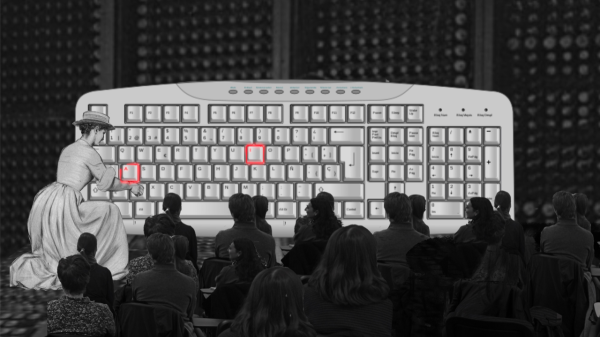
Independent Media Has an Infrastructural Problem
We need to roll out infrastructures that foster public values and the common good over the market imperatives, writes Agustin Ferrari Braun.Agustin Ferrari Braun (Tech Policy Press)
Passengers advised of Liverpool Lime Street overground closure on Easter Sunday - VibeWire Magazine
Railway upgrades in the Liverpool City Region mean there will be no overground services into Liverpool Lime Street station on Sunday 20 April.Guest authors (VibreWire Online)
York’s steam locomotive water tower set to get new lease of life - VibeWire Magazine
Former Victorian railway water tower to become rehearsal space for the Railway Institute BandGuest authors (VibreWire Online)

